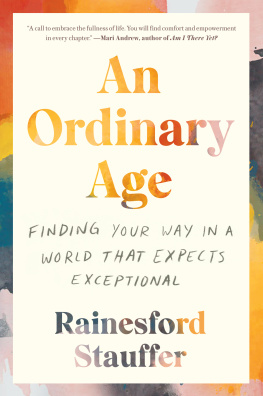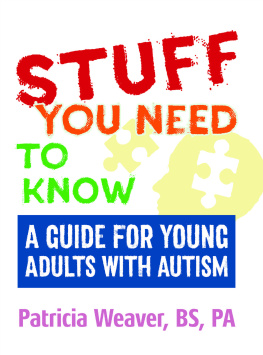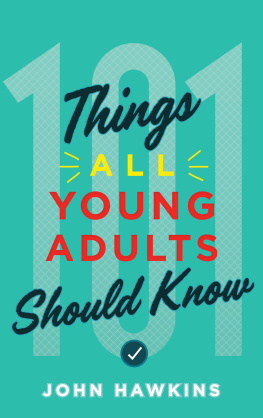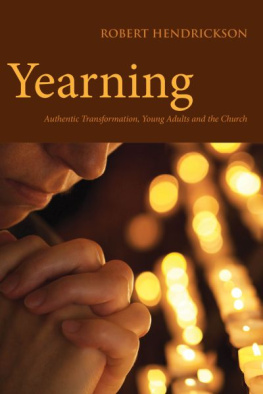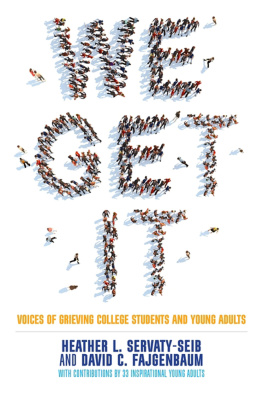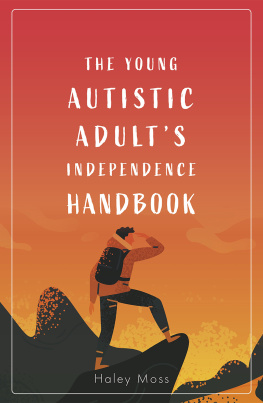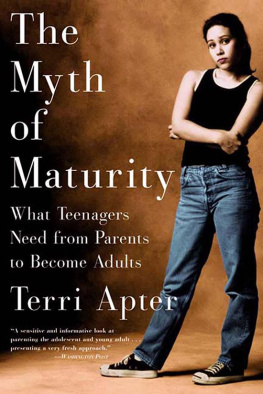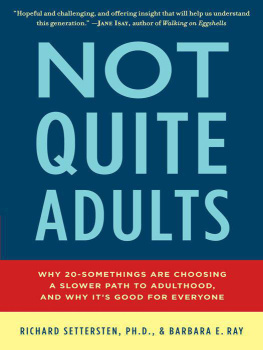Contents
Guide
To all of us, in all our ordinariness.
For my mom, the first to teach me the power of ordinary things, and my sister, who is everything extraordinary; my best friends.
Contents
Y OU ALWAYS THINK THE MOMENTS THAT WILL CHANGE YOUR life the most are the ones weve been trained to recognize: At graduation we move our tassel, we get a job we dont mind, we label our boxes and move to new cities, we take our Polaroid camera with us when we stay out late with our best friends in a new place, meeting new people. We know it when were in it: These are the times of our lives, so they say.
Its implied everywhereand sometimes said explicitly, by well-meaning parents and mentors, popular culture that illustrates coming of age as self-exploration and adventure tidily wrapped up by the finale scene, and maybe even a fixation on youth and being young. These are the best years of your life. These are the times you cant get back. This is the chance you have to make your life extraordinary. It echoed in my brain like a 2000s pop hit I didnt remember memorizing during my own checkered collection of milestones in young adulthood: Dropping out of college. Returning to my hometown like life was rewinding. Searching for ways to make myself morebraver, and bolder; more fearless, less cautious; more likablewhatever that means. What should have been singsong aspiration sounded more like a threat: When anything can happen, the pressure is on to make sure everything does.
If youre a young adult today (or even just know a young adult today), its a challenge not to feel as though finding yourself has been turned into a competitive sport. Now, it seems, striving to be extraordinary, being exceptional, and being special are the same as being capable, being fulfilled, and being happy. We have so-called dream jobs and side hustles just to try to pay the bills, college rankings that tell us where our formative years fall on the scale of public opinion, and which education is supposedly worth all the debt. Omnipresent illustrations of best lives, bodies, and selves constantly play out on Instagram, and the churn of perfectionism has radically amped up expectations that turn perfect into a theoretically meetable standard. There are new timelines for entering young adulthood, and what it means to be a fulfilled young person is being rethought in real time. But the myth of a best self, and a best life, following certain patterns and meeting certain benchmarks, remains.
Within that, there are the real-life pressures: lack of a helpful, substantial social safety net, systemic racism and discrimination, and a world literally on fire. Figuring out how to avoid getting sick so you dont rack up medical debt. Doing math on a napkin to assess how youll ever be able to take care of your parents on your current salary. Pondering whether all the messy pieces of your life will eventually feel steady and cohesive. Theres lifestyle expectations that are just not a practical part of life for a lot of young adults, sprawling from saving a certain amount of money by a certain age, pressure to make memories before the moment has even passed, knowing what youre good at and going after it, the right kind of social life so you never feel lonely, and above all: proceeding with total confidence that whatever youre doing is the best thing you could be doing. There are milestones were supposed to be hittingmoving out and apartments that are furnished, real jobs, and being prepared enough to map out a five-year plan for our dreams, despite a world that makes thinking that far in advance all but impossible. At the same time, young adults are supposed to be having the wild-and-free adventures that supposedly define this life period. Theres a lot going on.
This time of life also marks a point when youre conscious of growth occurring. It can be seen, with young adulthood being hyped as the part meant for moves for jobs or school, new circles of friends, all the big firsts of becoming an adult, from being able to pick your own groceries to landing a job that puts the college degree you went into debt for to use. It can be felt, too, when we start asking the big questions: What matters to me? Who am I supposed to be in the world? Is everyone else as overwhelmed as I am? Everything is just beginning, young adults are told. You can be anything. And sometimes, it feels so much effort and time are spent living up to the people we could be, its almost as if the people we are become an afterthought.
Every time I ventured off the prescribed path that supposedly marks how you find yourself and build your life as a young adult, I felt scatteredness and shame: When I left college after my freshman year to work even more hours than I did as a student, only to eventually return to school as an online student and full-time employee. When I moved home, a reality for lots of people for all kinds of reasons and one of the first that gets flagged as a young person having not made it. When I moved for jobs that never fully eliminated the need for a second job as a safety net. When I watched my hometown friends marry the loves of their lives and buy houses with fireplaces. All of this necessitates privilege that isnt a reality for all young people. And none of it is the enduring trauma or hardship of my own life. Instead, it felt like a pattern: Life was messier than how Id anticipated this time of life being, and the more people I spoke to, the more that feeling was echoed back to me. Theres a lot of lofty praise around being young and having it together, and the emphasis on having a particular kind of extraordinary adulthood felt as though it was telling in a couple ways: First, it treated young adults as a monolith, as if everyone was racing from the same starting line. Second, it also seemed to indicate that this was the time in which everything had to happen in order for your life to feel fulfilling, as if young people were in a buzzer-beater game of finding themselves and figuring out what matters to them, rather than those discoveries being lifelong. This pressure to know what your best life entails, and how to create it in young adulthood, felt worthy of a closer look to see where it stems from, how it shapes young people, and what systems and power structures enable it.
As I moved through my early twenties into my mid-to-late-twenties, I found myself yearning for simple things that rarely made the list of dream jobs, big moves, and adventures that have been marketed as cornerstones of young adulthood. I thought about the steadiness of a partner and community when I was supposed to feel confident and proud to go it alone. A sense of self that wasnt tethered to what I achieved or who I pleased. Framed photos of people I love in a home and a dresser in my bedroom, signs of staying instead of looking toward the horizon of the next new place. Over and over, I realized that no amount of cautious perfectionism was going to stop truly bad stuff from happening to me, or to my loved ones, and that there wasnt some threshold of achievement that would tidy up my messy parts, doubts, and uncertainties. It had never occurred to me that some of that, the false starts and self-doubt and everything coming with a side of chaos, was normal. And since these markers of what it means to be an extraordinary young adult were never a reality for all, anyway, I wondered why the averageness of coming of age wasnt talked about as much as achieving your wildest dreams.
Not all young adults have the opportunity to think about this at all. Within these pages, young people describe worrying about their parents lack of retirement savings, experiencing housing insecurity, the stress of chronic illnesses, and the pressure of working while in school. Thousands of others are breadwinners for their families, dealing with medical debt, experiencing abuse, and grappling with economic hardship. The enduring conception of emerging adulthooda time for wild and free exploration, identity experimentation, and creating your best selfisnt separate from factors including socioeconomic status, race, gender, geographic region, and class. While there might be characteristics or milestones traditionally aligned with young adulthood, its far from a one-size-fits-all time of life. Though societys fixation on youth can be seen in beauty standards, 30 Under 30 lists, and ageism rampant in the workforce, it feels like a version is illustrated in the pressure to have your life fully figured out, sense of self fully established, and achievement locked down by the time you make it to your mid-twenties. Its not realistic. And, in a way, its sad: When all the pressure is on to have the time of your life during

